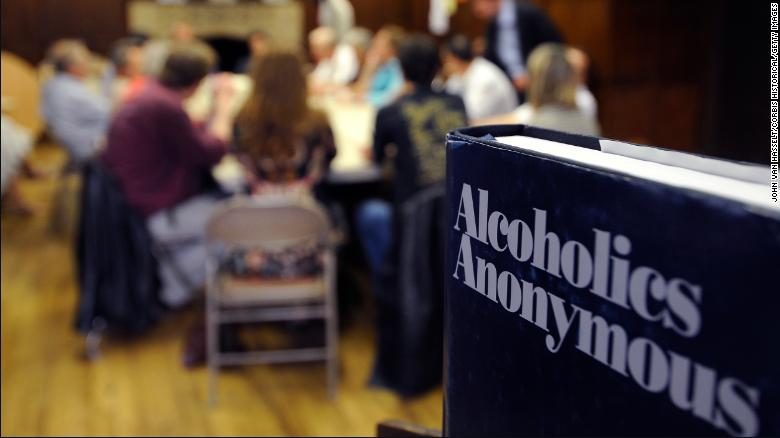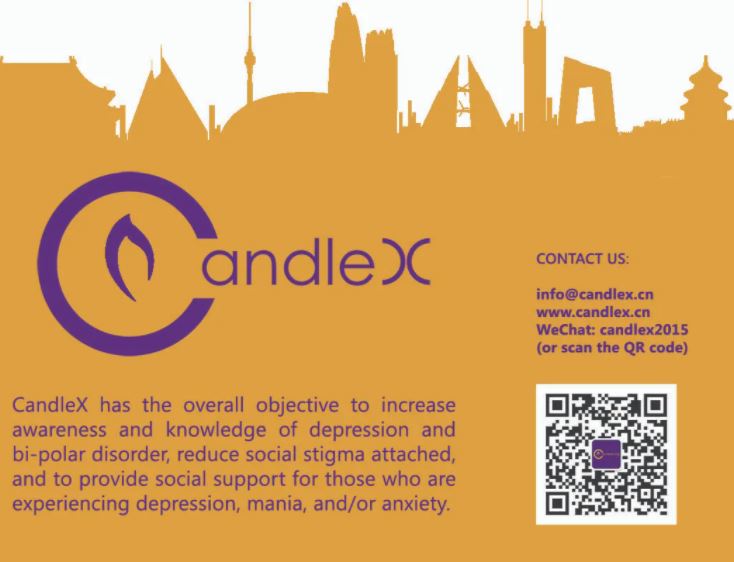This post comes courtesy of local mental health advocacy group CandleX.

In light of raising awareness on World Mental Health Day 2020, our teen interviewer spoke to “Michael” (not his real name), a volunteer from Alcoholics Anonymous (AA) in Beijing, about his experiences with alcoholism and recovery. AA is an international fellowship of men and women who help one another to stay sober and help other alcoholics achieve sobriety. As alcohol abuse can seriously damage a person’s mental wellbeing, we at CandleX hope to raise awareness on this issue.
With our Teens and Young Adults Learning Group, it has been our mission to find ways to engage and empower teenagers who may be struggling with mental health or who just have an interest in expanding their knowledge on the varying ways many can deal with mental health issues. Therefore, we do our best to engage our teens in as many ways as possible. Our interviewer Alison Qiu is from our Teens’ Learning Group as well as our Teen Writers’ Club. She is a Chinese high school student studying in the US. We want to give our special thanks to Anna Hartley from beijingkids for supporting our teen interviewer Alison on the interview and editing. With this interview, we hope that anyone who struggles with alcoholism may find this article helpful.
Michael initially came to China in early 2017 to take some time off and study Chinese. He had previously never left his home country of South Africa but says that experiencing Chinese culture has been amazing. An entrepreneur, Michael decided to channel his love of coffee first into a business in Beijing, and secondly into an import-export company in Shanghai, which he registered at the end of his first year in China. On Sept 19, Michael celebrated 14 years of sobriety, and he says that his recovery has gifted him with a fulfilling life in China and more profound relationships. We talked to him about his journey to sobriety and what he has learned.
When did your struggle with alcohol consumption start?
My drinking started when I was 12 and I was fortunate enough to have gone to a treatment facility five months after my 21st birthday. I’ve gotten sober since then and it’s been a blessing to be where I am and to still be sober.
What was your treatment experience like?
The treatment facility has a program to which a patient with any sort of addiction is introduced, including alcohol, drug abuse, eating disorders, and gambling disorders. That’s how I got introduced to AA for the first time. For the first week of treatment, I couldn’t sit outside the facility at all. I was on lockdown for seven days, so that I could get into a frame of mind where I could stop focusing on everything on the outside, but rather on the inside. In September of 2006, I attended my first AA meeting outside of the facility, and I’ve been going since then. We do online meetings as well, especially this year. I attend quite a few meetings – two or three a week – with my fellows from South Africa, plus maybe three meetings in Beijing. So I go to about five meetings per week.

Are these meetings helpful for you? If so, how?
Extremely. Before AA, I tried to stop drinking on my own but I couldn’t control it. I tried changing the type of alcohol, the location where I went to drink, and people that I drank with – I tried everything but I just couldn’t. But since going to treatment and meetings, I saw something that would save me from my obsession. I could listen to other people share their experiences going through things that I was too ashamed and scared to acknowledge. I hadn’t known that there was a solution for alcohol consumption, but after they shared their experiences and hope, I was able to see that some people have gone through similar things as I have. They’ve all found something that’s been keeping them sober, and that encouraged me to want sobriety even more. Before I went into a treatment facility, I’d always had this huge dream of being sober, of being able to live a life, travel the world, save money, buy a car, and be a good partner, brother, and son. But drinking confined me to a space where I was unable to do anything of that kind.
During the first two weeks of going to meetings, I managed to get myself a sponsor. He came to share at the treatment facility, and his story started exactly the same as mine and was similar in so many ways. I was emotional because I related so much, especially since I always thought I was different, and that no one would understand what I was going through on a daily basis. Knowing that other people struggle the same way made me feel like I was not that different. That gave me hope. After he finished sharing, I went up to him and asked him if he would be my sponsor. I was stuttering and couldn’t get the words out because I was so emotional. But he said yes. Since then, I was extremely scared to go back to where I had been in life. I started putting in a lot of effort to secure a good foundation.
What were some negative consequences of alcohol abuse in your life?
There are so many. Let’s start with the obvious: my family relations were damaged. My father and my stepmother were divorced because of my behavior of drinking as a teenager and the amount of trouble I caused. I have one biological sister, three half-sisters, and a half-brother. Throughout the years of my drinking, I seriously damaged my relationship with family members, because I was rebellious and my parents didn’t know how to deal with me. They didn’t know what was going on. I was really good at manipulating and lying to them. I was on survival instinct; I tried to cope with everything with alcohol.
I also damaged friendships and was unemployable. People gave me a chance to work after I finished school, but they found out that they couldn’t trust me because of all the drinking and the hangovers. On an emotional level, alcohol abuse was terrible. The shame and guilt were so much that I thought I couldn’t live with it. I tried to commit suicide three times, and thankfully I failed.
How have things changed since you’ve been sober?
I get goosebumps when I speak about what’s gotten better. I can go to a pub with friends normally. They know my story, and they know that I don’t drink, but they always make sure that I have a cup of Coca-Cola in my hands. It’s not about getting drunk, it’s just about a group of guys having fun together; talking, looking at girls, talking about football, and doing other typical guy things. They don’t have to worry about driving back home under the influence of alcohol because they have a designated driver (me). That was something that really stood out because I could start becoming a real friend. I could start becoming a brother who showed up on time for my two sisters’ weddings. I could be there when my nephews were born. I could come to China.
I’m getting emotional because that means a lot to me. I’ve been able to achieve so much in life since I’ve gotten sober. I started two businesses in China almost a year after I got here. I made some of the most meaningful friendships in my life. I met some of the most amazing and beautiful souls. I wake up and feel grateful for where I’m at. Today I am not obsessed with drinking. I can go to family gatherings and I can go out with my friends and I never have the desire to drink anymore.

Looking back at your experiences, what advice would you give teenagers and young adults who might be struggling with alcohol or other substances?
As a teenager who struggled with alcohol consumption, I felt too ashamed to admit it for the fear of what my friends would think about me. Now, I couldn’t care less how other people view me when I acknowledge that I’m struggling with something, because I’m not here to live my life for them to judge if I’m ok. I never knew life could be this beautiful. As a young adult, I thought my life was over. I thought I would not be able to have fun; I thought I’d be judged, but after I reached out, so many meaningful friendships were created.So my advice would be “don’t worry about what other people think.” If you’re struggling, just reach out. There’s always a person who is willing to listen, as long as you open up to the right kind of people. Don’t be afraid to put yourself out there. I’m extremely grateful for where I am today. I wouldn’t be here if it wasn’t for AA’s support groups and meetings.





